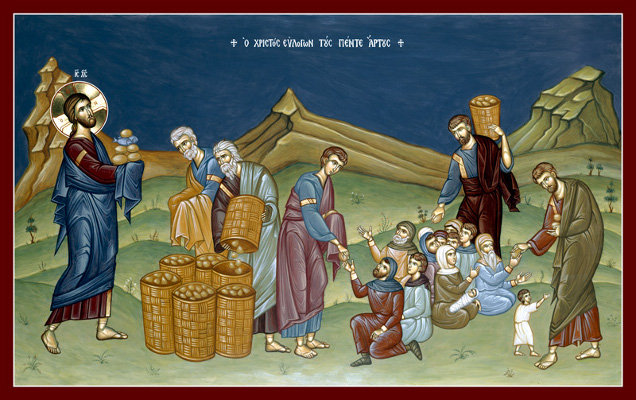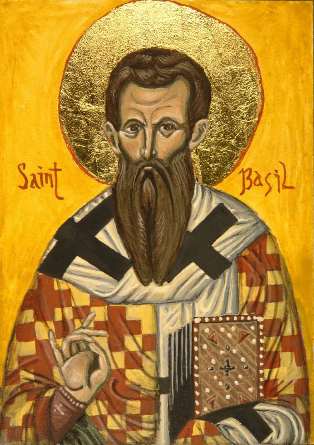What’s the difference between the feeding of the 4,000 and the 5,000?
The difference is obviously 1,000! However, there’s another importance difference and I’d like to take a look at that today…

"We are travellers…not yet in our native land" – St. Augustine
The difference is obviously 1,000! However, there’s another importance difference and I’d like to take a look at that today…

These notes have been taking up too much of my time again. I’m really going to try and concentrate on keeping them brief…
Our Readings this week continue building on the themes of the past few weeks. In our First Reading we hear about how God provided bread and water for Elijah in the desert and in our Gospel Jesus continues with His the “Bread of life Discourse”. In our Second Reading Paul continues His moral exhortation to the Ephesians.

O sacrament of mercy, O sign of unity, O bond of love! Whoso wishes to live, let him draw nigh, believe, be incorporated, that he may be quickened. – St. Augustine
I’ve been on vacation this week so my notes are late and not quite as polished as they are normally.
Our Readings this week focus again on the subject of sacred food.
In the First Reading, we read how the Israelites were fed with manna in the desert. The manna is also the subject of this week’s Psalm, as psalmist proclaims “The Lord gave them bread from heaven”. These are also the words quoted by the crowd who come to Jesus after “The Feeding of the Multitude”. The crowd comes expecting another free meal, but rather than filling their stomachs, Jesus directs them towards deeper spiritual realities, declaring Himself to be “the bread of life” and that “whoever comes…will never hunger, and whoever believes…will never thirst”.
Our understanding of the Second Reading may be illuminated by considering the rite of Baptism in the early centuries of the Church. In preparation for the Sacrament, someone wishing to be baptised would receive a period of instruction. Afterwards, he would then arrive at the Baptismal pool and shed himself of his clothes, symbolically demonstrating that he wished to “put away the old self of [the] former way of life, corrupted through deceitful desires”. He would then descend into the baptismal pool where he would be washed in the name of the Father, Son and Holy Spirit, “renewed in the spirit of [his] mind”. He would then ascend and be clothed in a white garment to show that he had “put on the new self, created in God’s way in righteousness and holiness of truth”. After having been washed in the waters of regeneration, this newly-born Christian would be admitted to the liturgy of the Eucharist where he would finally receive the bread of life.
We too have been washed in the waters of baptism, we too have been admitted to the altar. Let us live our lives this week in the “holiness of truth” . We do not receive simply the “bread of angels”, but something even greater, “the bread of life” Himself.
When, through the hand of the priest, you receive the Body of Christ, think not of the priest which you see, but of the Priest you do not see. The priest is the dispenser of this food, not the author. The Son of man gives Himself to us, that we may abide in Him, and He in us – Alcuin

The Readings this week focus on God’s gracious provision and in the First Reading and the Gospel this gracious provision is manifested through bread.
In the First Reading, bread is multiplied by the Prophet Elisha and in the Gospel, bread is multiplied at the hands of Jesus. These Readings teach us trust in God, to proclaim with the psalmist that “The hand of the Lord feeds us; he answers all our needs”. Both of these miracles allude to the Eucharist, pointing towards the time when Jesus will be consumed throughout the world under the appearance of bread and wine.
In our Second Reading St. Paul tells us that Christians are called to be united in “one body…one Spirit…one hope…one Lord, one faith, one baptism; one God and Father”. This oneness and Church unity finds its clearest expression in the Eucharist. At the Mass, we come together as God’s family, and because though “many, [we are] are one body, for we all share the one loaf” (1 Corinthains 10:17).
As we gather together at the Liturgy this week, let us be mindful that the whole family of God, both in Heaven and on earth, is gathering together with us. United as one, we celebrate the Lord’s Resurrection and are once again fed by the hand of the Lord.
There He is: King of kings and Lord of lords, hidden in the bread. To this extreme He humbled Himself for love of you –St. Josemaria Escriva


“The bread you store up belongs to the hungry; the cloak that lies in your chest belongs to the naked; the gold you have hidden in the ground belongs to the poor.” – St. Basil the Great
Last week we had a meeting of the Young Adult Commission. At these meetings we go over the current Young Adult initiatives in the Diocese and plan the new events for the months ahead.
At these meetings I’m often inspired. It’s encouraging to be with other Young Adult leaders who are passionate about what they’re doing. It’s great to feed off one another’s energy and catch a vision of “what could be…”.
Therefore encourage one another and build each other up – 1 Thessalonians 5:11
At last week’s meeting we came up with some superb ideas. Let me tell you, there’s some really good stuff in the pipeline for this summer…
 Yesterday I published a blog entry which contained the text which we are going to study tonight at the JP2 Group. We’re going to read this document as part of our three-week series looking at worship in the Early Church.
Yesterday I published a blog entry which contained the text which we are going to study tonight at the JP2 Group. We’re going to read this document as part of our three-week series looking at worship in the Early Church.
The text I posted yesterday was a substantial extract from a work by Justin Martyr. St. Justin was a Christian in the 2nd Century and he wrote an apologetic work addressed to the Emperor known as his First Apology. In this ancient document he provides a defense of the Christian faith, but he also describes in some detail the Christian worship of his era.
Justin wrote his First Apology in around AD 150 and, despite the nascent state of the Church at this time, the liturgy has a clear structure. Catholics and all those who attend “liturgical” churches should be able to recognize many things in Justin’s description which are present in their own worship:
1. Sunday Worship
Groups such as the Seventh Day Adventists say that Christians should worship on the Sabbath (Saturday), but it’s clear from St. Justin that in the Second Century Christian worship was on Sunday:
“And on the day called ‘Sunday’, all who live in cities or in the countryside gather… We hold our assembly on Sunday because it is the first day, on which God brought forth the world from darkness and matter. On the same day, Jesus Christ our Saviour rose from the dead”